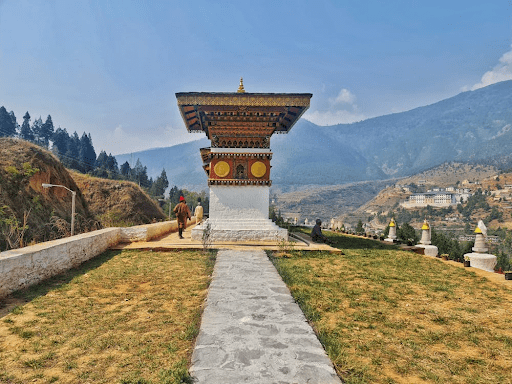
Bhutan is known for its brilliant and colorful celebrations.
Bhutan’s tsechu celebrations are historic manifestations of its Buddhist culture. The majority of these events honor Guru Rimpoche, the saint who converted Bhutan to Buddhism in the early eighth century. We have more reasons on what Bhutan is well known for.
Bhutan is one of the nicest destinations to visit if you want a relaxing and revitalizing vacation.
Festivals

Tshechu is a religious festival celebrated annually in temples, monasteries, and dzongs across the country. It is held on the tenth day of the tenth month of the lunar calendar, which corresponds to Guru Rimpoche’s birthday (Guru Padmasambhava). The exact month of the Tshechu, however, varies from place to place and temple to temple.
There are large gatherings of entire communities to watch religious mask dances, receive blessings, and socialize. You witness colorful Bhutanese dances and other forms of entertainment in addition to mask dances.
It is believed that in order to receive blessings and wash away sins, everyone must attend a Tshechu and witness the mask dances at least once. Every mask dance performed during a Tshechu has a special meaning or a story behind it, and many are based on stories and incidents dating back to the 8th century, during Guru Padmasambhava’s life.
Mask dances are performed in monasteries by monks, and in remote villages by monks and village men working together. Two of the most popular Tshechus in the country are the Paro and Thimphu Tshechus in terms of participation and audience.
Culture

Bhutanese tradition is deeply rooted in its Buddhist heritage, be it in the dress (Kho for Bhutanese men and Kira for Bhutanese women), the language (Bhutanese or Dzongkha), the cultural activities (including masked dances, dance dramas accompanied by traditional music at festivals), or the national sport archery, which you may experience when visiting Bhutan. Also, in Bhutanese families, inheritance is passed down through the females rather than the men, thus the daughters inherit their parents’ house and the guy is expected to make his own place in the world and is invited to move to his wife’s home.
Landscape

Traveling through Bhutan will reveal steep and high mountains crisscrossed by fast river networks. Bhutan’s amazing range of biodiversity and ecosystems, which are worth viewing, is aided by its extraordinary geographical diversity and different climate conditions.
Seasons

Bhutan’s weather is divided into five distinct seasons: summer, monsoon, autumn, winter, and spring. The western section of Bhutan receives more monsoon rains, whilst the southern part has hot humid summers and cool winters, while the center and eastern parts of Bhutan are moderate and drier, with warm summers and cool winters. Bhutan thus provides you the freedom to choose the location and time of year to visit, based on your preferred climatic circumstances.
Attractions

The National Memorial Chorten nearby, where Buddhists circle clockwise while reciting prayers and spinning prayer wheels, and one of Bhutan’s largest bronze Buddha statues gilded in gold that towers over Thimphu. The Tiger’s Nest (Taktsang) is a picturesque monastery in Bhutan, located on the cliff-side of the upper Paro valley. Other magnificent sites in Bhutan are Punakha Dzong, Zuri Dzong Hike, Gangtey Valley, and Bumthang Valley.
Cuisine

Ema datshi, Bhutan’s national delicacy, is an extremely spicy dish made with cheese and chillies that the Bhutanese take great pride in and that you must try. Bhutanese people are also proud of the fact that under the Cigarettes Act of 2010, Bhutan was the first country in the world to prohibit the sale of tobacco, ensuring clean and pure air.
Royal

Bhutan’s transition from absolute monarchy to constitutional monarchy was completed in 2008, with the country’s first general election. Jigme Khesar Namgyel Wangchuck, the reigning king, married Jetsun Pema on October 13, 2011. And you might be surprised to learn that spotting/meeting Bhutan’s King is not as difficult as you might expect.
Happiness

Bhutan is the only country in the world that officially measures the well-being of its people. This index is known as GNH (Gross National Happiness). Instead of focusing on GDP, Bhutan seeks to track the well-being of its people. The United Nations participated in this idea in 2011 and published the World Happiness Report in 2012. The annual report uses Gallup’s data to rank countries not only on economic aspects, but also on factors such as social, health and environmental well-being.
Art

Bhutanese arts and crafts are one-of-a-kind and have their origins in Buddhism. Almost all artistic representations depict a struggle between two – good & evil. Bhutanese culture are primarily subjective, symbolic, and impersonal in nature. They are also highly ornamental and decorative. Bhutan’s artistic heritage can be traced back to the great 15th century terton (Treasure discoverer) Pema Lingpa, who was a talented painter, sculptor, and architect.
Film

Beskop Tshechu is Bhutan’s first documentary, animation, and short film festival, dedicated to promoting and encouraging creative filmmaking in the country. The festival is run on a non-profit basis by a group of filmmakers, artists, and other volunteers. Events and screenings are free and open to the public. Beskop Tshechu was first launched in celebration of the historic Royal Wedding in Bhutan 2011. Beskop Tshechu takes place in October, the same month as the Royal Wedding’s 10th anniversary.
Bhutan is best known for its diverse culture and festivals that have been passed down by generations. Even with the introduction to modern technology and foreign cultures the main focus of the Government lies in preserving all the traditional practices. This is why many tourists from all over the world love visiting Bhutan as their favorite destinations.
Visit Bhutan and experience its magnificent beauty.








Comments are closed